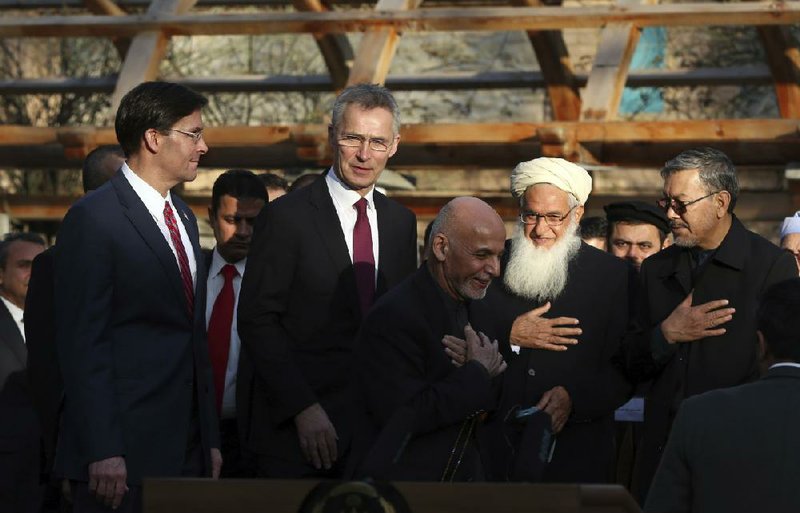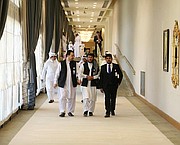DOHA, Qatar -- The United States on Saturday signed a peace agreement with the Taliban that is aimed at ending America's longest war and bringing U.S. troops home from Afghanistan more than 18 years after the Sept. 11, 2001, terrorist attacks.
The historic deal, signed by chief negotiators from the two sides and witnessed by Secretary of State Mike Pompeo, calls for the withdrawal of all American and allied forces in the next 14 months and will allow President Donald Trump to keep a campaign pledge to extract the U.S. from "endless wars."
At the White House, Trump told reporters the U.S. deserves credit for having helped Afghanistan take a step toward peace. He spoke cautiously of the deal's prospects for success and advised the Taliban against violating their commitments.
"We think we'll be successful in the end," he said, referring to all-Afghan peace talks and a final U.S. exit. He said he will be "meeting personally with Taliban leaders in the not-too-distant future," and described the group as "tired of war."
[Video not showing up above? Click here to watch » https://www.youtube.com/watch?v=eATnnNyWjTY]
He did not say where or why he plans to meet with Taliban leaders. He said he thinks they are serious about the deal they signed but warned that if it fails, the U.S. stands ready to restart combat.
"If bad things happen, we'll go back" in with military firepower, Trump said.
Pompeo was similarly cautious.
"Today, we are realistic. We are seizing the best opportunity for peace in a generation," Pompeo said in the Qatari capital, Doha. "Today, we are restrained. We recognize that America shouldn't fight in perpetuity in the graveyard of empires if we can help Afghans forge peace."
Under the agreement, the U.S. would draw its forces down to 8,600 from 13,000 in the next three to four months, with the remaining U.S. forces withdrawing in 14 months. The complete pullout would depend on the Taliban meeting their commitments to prevent terrorism, including specific obligations to renounce al-Qaida and prevent that group or others from using Afghan soil to plot attacks on the U.S. or its allies.
The deal sets the stage for intra-Afghan peace talks to begin around March 10, with the aim of negotiating a permanent cease-fire and a power-sharing agreement between rival Afghan groups. It's perhaps the most complicated and difficult phase of the plan. It does not, however, tie America's withdrawal to any specific outcome from the all-Afghan talks, according to U.S. officials.
[Video not showing up above? Click here to watch » https://www.youtube.com/watch?v=EgUtVa6_FLs]
Pompeo said that "the chapter of American history on the Taliban is written in blood" and stressed that the road ahead would be difficult.
At a parallel ceremony in Kabul, U.S. Defense Secretary Mark Esper and Afghan President Ashraf Ghani signed a joint statement committing the Afghan government to support the U.S.-Taliban deal, which is viewed skeptically by many war-weary Afghans, particularly women who fear a return of repression under the ultraconservative Taliban.
BILLIONS SPENT
President George W. Bush had ordered the U.S.-led invasion of Afghanistan in response to 9/11. Some U.S. troops currently serving there had not yet been born when al-Qaida hijackers flew two airliners into the twin towers of the World Trade Center, crashed another into the Pentagon and was forced to take down a fourth in a Pennsylvania field. Nearly 3,000 people were killed.
It only took a few months to topple the Taliban and send Osama bin Laden and top al-Qaida militants scrambling across the border into Pakistan, but the war dragged on for years as the U.S. tried to establish a stable, functioning state in one of the least developed countries in the world. The Taliban regrouped, and currently hold sway over half the country.
The United States has spent nearly $1 trillion in Afghanistan, mostly on defense for its own soldiers but also for the Afghan military. More than 3,500 coalition soldiers have died in Afghanistan, more than 2,400 of them Americans.
While Pompeo attended the ceremony in Qatar, he appeared to avoid any direct contact with the Taliban delegation. The deal was signed by U.S. peace envoy Zalmay Khalilzad and Taliban leader Mullah Abdul Ghani Baradar, who then shook hands. Members of the Taliban shouted "Allahu Akhbar" or "God is greatest." Others in attendance, including the Qatari hosts, applauded politely.
"We are committed to implementing this agreement," Baradar said in brief comments. "I call on all Afghans to honestly work for peace and gather around the table for peace negotiations."
Ghani also pointed to advances made in Afghan society, including freedom of speech and the advancement of women's rights.
"Today can be the moment of overcoming the past," he said.
Some Taliban celebrated the deal as a victory. "Today is the day of victory, which has come with the help of Allah," said Abbas Stanikzai, one of the Taliban's lead negotiators.
"It is glorious to watch Afghan people walking through the streets to see them dancing and celebrating peace," Pompeo told reporters after the pact was signed. "The Afghan people are thirsting for the very opportunity that we have now presented to them."
"We're seizing the best opportunity for peace in a generation built on the hard work of our soldiers, diplomats, businessmen, aid workers, friends, and the Afghans themselves," Pompeo said.
But criticism of the pact even came from Trump's former White House team.
Former national security adviser John Bolton said the deal brings an "unacceptable risk to America's civilian population."
"Legitimizing Taliban sends the wrong signal to ISIS and al-Qaida terrorists, and to America's enemies generally," Bolton wrote in a tweet.
'VICTORY FOR PEACE'
Meanwhile in Kabul, in a rare show of unity, Ghani sat beside his chief political rival Abdullah Abdullah at the ceremony with Esper and NATO Secretary-General Jens Stoltenberg that included a declaration between the Afghan government and the United States intended to show U.S. support for Afghanistan.
Stoltenberg called Saturday a "victory for peace" and noted increases in women's rights, life expectancy and respect for human rights in Afghanistan.
"The challenge now is to secure these gains," he said.
For Afghanistan's government, which has been deeply criticized by its political opponents, including Abdullah, the real job ahead will be cobbling together a negotiating team to sit across from the Taliban. The talks are to determine the face of a postwar Afghanistan.
Those negotiations, to be held in Oslo, Norway, are expected to begin around March 10. The Taliban have made clear that they expect the Afghan government to release their 5,000 prisoners before the start of negotiations. Around that time, the Taliban are to release 1,000 government troops. Until now the government has not agreed to the prisoner release.
Esper warned the road ahead was a long one and would not be without its challenges. "This is a hopeful moment, but it is only the beginning, the road ahead will not be easy."
There are currently more than 16,500 soldiers serving under the NATO banner, of which 8,000 are American. Germany has the next largest contingent, with 1,300 troops, followed by Britain with 1,100.
In all, 38 NATO countries are contributing forces to Afghanistan. The alliance officially concluded its combat mission in 2014 and now provides training and support to Afghan forces.
The U.S. has a separate contingent of 5,000 troops deployed to carry out counterterrorism missions and provide air and ground support to Afghan forces when requested.
Seven days ago, the Taliban began a seven-day "reduction of violence" period, a prerequisite to the peace deal signing. The agreement does not specify whether that commitment would continue.
The spokesman for the Taliban's Qatar office, Suhail Shaheen, told The Washington Post that the Taliban hoped for a "permanent solution" to violence levels. But the pledge for a weeklong period of reduced violence has "ended," he said.
Information for this article was contributed by Matthew Lee, Kathy Gannon, Rahim Faiez, Tameem Akhgar, Lorne Cook, Robert Burns and Joseph Krauss of The Associated Press; by Sarah Dadouch, Susannah George, Dan Lamothe, Sharif Hassan and Haq Nawaz Khan of The Washington Post; and by Eltaf Najafizada and Nick Wadhams of Bloomberg News.
A Section on 03/01/2020

